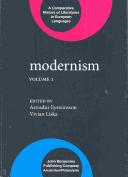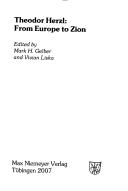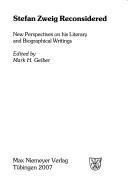| Listing 1 - 10 of 10 |
Sort by
|

ISBN: 9780253348753 0253348757 9786612065781 1282065785 0253000076 9780253000071 9781282065789 Year: 2008 Publisher: Bloomington, Ind. Indiana University Press
Abstract | Keywords | Export | Availability | Bookmark
 Loading...
Loading...Choose an application
- Reference Manager
- EndNote
- RefWorks (Direct export to RefWorks)
With contributions from a dozen American and European scholars, this volume presents an overview of Jewish writing in post--World War II Europe. Striking a balance between close readings of individual texts and general surveys of larger movements and underlying themes, the essays portray Jewish authors across Europe as writers and intellectuals of multiple affiliations and hybrid identities. Aimed at a general readership and guided by the idea of constructing bridges across national cultures, this book
Literature --- Jewish religion --- anno 1900-1999 --- Europe --- European literature --- Jewish authors --- Jewish literature --- Jews --- Judaism and literature --- History and criticism. --- Intellectual life. --- Literature and Judaism --- Hebrews --- Israelites --- Jewish people --- Jewry --- Judaic people --- Judaists --- Ethnology --- Religious adherents --- Semites --- Judaism --- Judaica --- Hebrew literature --- Authors --- Jewish authors&delete& --- History and criticism --- Intellectual life
Book
ISBN: 9783110458114 311045811X 9783110457438 3110457431 3110455323 3110608316 Year: 2016 Publisher: De Gruyter
Abstract | Keywords | Export | Availability | Bookmark
 Loading...
Loading...Choose an application
- Reference Manager
- EndNote
- RefWorks (Direct export to RefWorks)
Kafka's work has been attributed a universal significance and is often regarded as the ultimate witness of the human condition in the twentieth century. Yet his work is also considered paradigmatic for the expression of the singular that cannot be subsumed under any generalization. This paradox engenders questions not only concerning the meaning of the universal as it manifests itself in (and is transformed by) Kafka's writings but also about the expression of the singular in literary fiction as it challenges the opposition between the universal and the singular. The contributions in this volume approach these questions from a variety of perspectives. They are structured according to the following issues: ambiguity as a tool of deconstructing the pre-established philosophical meanings of the universal; the concept of the law as a major symbol for the universal meaning of Kafka's writings; the presence of animals in Kafka's texts; the modernist mode of writing as challenge of philosophical concepts of the universal; and the meaning and relevance of the universal in contemporary Kafka reception. This volume examines central aspects of the interplay between philosophy and literature.
Philosophy in literature --- Kafka, Franz, --- Criticism and interpretation --- Authors, Austrian --- Austrian authors --- Singularity. --- modernism. --- narrative. --- universalism. --- Ḳafḳa, Frants, --- Kʻapʻŭkʻa, --- Kafka, F. --- Kaphka, Phrants, --- Ḳafḳa, Amshel, --- Kafka, Franc, --- Kʻa-fu-kʻa, --- Kʻa-fu-kʻa, Fu-lang-tzʻu, --- Kāk̲apkā, --- Кафка, Франц, --- Кафка, Ф., --- フランツ・カフカ, --- קאפקא, פראנץ, --- קאפקא, פרנץ, --- קאפקה, פראנץ, --- קפקא, --- קפקא, פרנץ, --- كافكا، فرانتس، --- كفكا، فرنز، --- کافکا، فرانز، --- Kafka, Franz

ISBN: 9789027234544 902723454X 9786612152696 1282152696 9027292043 9789027292049 Year: 2007 Publisher: Amsterdam Benjamins
Abstract | Keywords | Export | Availability | Bookmark
 Loading...
Loading...Choose an application
- Reference Manager
- EndNote
- RefWorks (Direct export to RefWorks)
The two-volume work Modernism has been awarded the prestigious 2008 MSA Book Prize! Modernism has constituted one of the most prominent fields of literary studies for decades. While it was perhaps temporarily overshadowed by postmodernism, recent years have seen a resurgence of interest in modernism on both sides of the Atlantic. These volumes respond to a need for a collective and multifarious view of literary modernism in various genres, locations, and languages. Asking and responding to a wealth of theoretical, aesthetic, and historical questions, 65 scholars from several countries test the usefulness of the concept of modernism as they probe a variety of contexts, from individual texts to national literatures, from specific critical issues to broad cross-cultural concerns. While the chief emphasis of these volumes is on literary modernism, literature is seen as entering into diverse cultural and social contexts. These range from inter-art conjunctions to philosophical, environmental, urban, and political domains, including issues of race and space, gender and fashion, popular culture and trauma, science and exile, all of which have an urgent bearing on the poetics of modernity.
Modernism (Aesthetics). --- Modernism (Art). --- Modernism (Literature). --- Comparative literature --- Aesthetics of art --- 82 "18/19" --- 82.015 --- 82.015 Literaire stromingen --- Literaire stromingen --- 82 "18/19" Literatuur. Algemene literatuurwetenschap--Hedendaagse Tijd --- Literatuur. Algemene literatuurwetenschap--Hedendaagse Tijd --- Modernisme (Littérature) --- Modernisme (Esthétique) --- Modernism (Aesthetics) --- Modernism (Art) --- Modernism (Literature) --- Crepuscolarismo --- Literary movements --- Postmodernism (Literature) --- Art, Modernist --- Modern art --- Modernism in art --- Modernist art --- Aesthetic movement (Art) --- Art, Modern --- Aesthetics

ISBN: 9783484651678 3484651679 3110936054 9783110936056 Year: 2007 Publisher: Tübingen Niemeyer
Abstract | Keywords | Export | Availability | Bookmark
 Loading...
Loading...Choose an application
- Reference Manager
- EndNote
- RefWorks (Direct export to RefWorks)
Dieser Band besteht aus 16 Beiträgen. Sie sind revidierte und erweiterte Fassungen der Vorträge, die 2004 im Rahmen internationaler Tagungen über Theodor Herzl (1860-1904) gehalten wurden, um seines hundertsten Todestages zu gedenken. Der Schwerpunkt des Bandes liegt auf literarischen und kulturpolitischen Fragestellungen zu Herzl sowie auf Themen, die mit der Rezeption seiner Werke sowie seiner Persönlichkeit zu tun haben. Andere Themen, die in diesem Buch diskutiert werden, sind u.a. Herzl zwischen Mythos und Messianismus, Herzls Nationalismus, Herzl und Afrika, Herzl als Dramatiker, Herzl im Film sowie die Herzl-Rezeption in Israel und in Europa. In 2004 the one-hundredth anniversary of Theodor Herzl’s death was commemorated throughout the world. The myth of Herzl, as it has developed over the last century, has perhaps become more important than the historical figure. This volume contains revised and expanded essays, which were originally delivered as lectures at international Herzl centennial conferences in Antwerp, London, and Jerusalem. Topics treated include the Herzl myth, Herzl’s nationalism and Zionism, his self-understanding and image, his authorship of comedies and philosophical tales, Herzl and Africa, as well as his reception in Israeli and other literature. Zweig films are also considered within this same context.
Herzl, Theodor --- Zionism --- Herzl, Theodor, --- Herzl, Binyamin Zeʼev, --- Hertsl, Binyamin Zeʼev, --- Hartzil, Thiyūdūr, --- Gert︠s︡lʹ, Benʹi︠a︡min Zeėv, --- Gert︠s︡lʹ, Teodor, --- Herzl, Teodoro, --- Herzl, Théodore, --- Hertsl, Ṭeodor, --- Hertsel, Binyamin Zeʼev, --- Hertsel, Teʼodor, --- הירצל, טיאודור --- הירצל, תיאודור --- הערצל --- הערצל, בנימין בן יעקב, --- הערצל, בנימין טהעאדאר --- הערצל, טה --- הערצל, טהעאדאר --- הערצל, טהעאדאר, --- הערצל, טעאדאר --- הערצל, טעאדאר, --- הערצל, ט. --- הערצל, ת., --- הערצעל, ט. --- הרצל --- הרצל, בנימין זאב --- הרצל, בנימין זאב, --- הרצל, טיאודור --- הרצל, ט., --- הרצל, תאודור --- הרצל, תאודור, --- הרצל, תיאודור --- הרצל, תיאודור, --- הרצל, תיאודר, --- הרצל, ת., --- טעאדאר הערצעל --- هرتزل، ثيودر، --- Герцль, Беньямин Зеэв, --- Герцль, Теодор,
Book
ISBN: 9004449442 9789004449442 9789004449220 9004449221 Year: 2021 Publisher: Leiden Boston
Abstract | Keywords | Export | Availability | Bookmark
 Loading...
Loading...Choose an application
- Reference Manager
- EndNote
- RefWorks (Direct export to RefWorks)
Recent developments within and beyond Europe have variously challenged the very idea of Europe, calling it into question and demanding reconsideration of its underlying assumptions. The essays collected here reassess the contemporary position of a perceived "European" identity in the world, overshadowed as it is by the long antecedents and current crisis of triumphalist Eurocentrism. While Eurocentrism itself is still a potent mind-set, it is now increasingly challenged by intra-European crises and by the emergence of autonomously non-European perceptions of Europe. The perspectives assembled here come from the fields of political, cultural and literary history, contemporary history, social and political science and philosophy.
Nationalism --- Group identity --- Group identity.
Book
ISBN: 3211992901 Year: 2010 Publisher: Springer Vienna
Abstract | Keywords | Export | Availability | Bookmark
 Loading...
Loading...Choose an application
- Reference Manager
- EndNote
- RefWorks (Direct export to RefWorks)
Veils --- Veils in literature. --- Social aspects. --- History. --- Political aspects.
Book
ISBN: 3110393328 311036719X 3110372932 3110578611 Year: 2015 Publisher: De Gruyter
Abstract | Keywords | Export | Availability | Bookmark
 Loading...
Loading...Choose an application
- Reference Manager
- EndNote
- RefWorks (Direct export to RefWorks)
In the past decades the "German-Jewish phenomenon" (Derrida) has increasingly attracted the attention of scholars from various fields: Jewish studies, intellectual history, philosophy, literary and cultural studies, critical theory. In all its complex dimensions, the post-enlightenment German-Jewish experience is overwhelmingly regarded as the most quintessential and charged meeting of Jews with the project of modernity. Perhaps for this reason, from the eighteenth century through to our own time it has been the object of intense reflection, of clashing interpretations and appropriations. In both micro and macro case-studies, this volume engages the multiple perspectives as advocated by manifold interested actors, and analyzes their uses, biases and ideological functions over time in different cultural, disciplinary and national contexts. This volume includes both historical treatments of differing German-Jewish understandings of their experience - their relations to their Judaism, general culture and to other Jews - and contemporary reflections and competing interpretations as to how to understand the overall experience of German Jewry.
Jews --- History --- Identity. --- Social conditions. --- Hebrews --- Israelites --- Jewish people --- Jewry --- Judaic people --- Judaists --- Ethnology --- Religious adherents --- Semites --- Judaism --- German-Jewish Intellectuals. --- Jewish Modernity.
Book

ISBN: 9783110336917 311033691X 9783110460803 9783110459296 3110460807 3110459299 Year: 2019 Publisher: Berlin Boston
Abstract | Keywords | Export | Availability | Bookmark
 Loading...
Loading...Choose an application
- Reference Manager
- EndNote
- RefWorks (Direct export to RefWorks)
This volume explores the ways in which Jerusalem is represented in Psalms - from its position in the context of liturgical and pilgrim songs to its role as metaphor. Jerusalem in the Book of Psalms is the site of scenes of redemption, joy, and celebration of the proximity to God and the house of the Lord. But it is also the quintessential locus of loss, marked by cries over the devastating destruction of the Temple. These two antithetical poles of Jerusalem are expressed in both personal terms as well as within a collective framework. The bulk of the articles are devoted to questions of reception, to the ways in which the geographies of the Book of Psalms have travelled across their native bounds and entered other historical settings, acquiring new forms and meanings.
223.3 --- 291.35 --- 291.35 Heilige plaatsen: altaren; tempels; pagoden; kerken; moskeeën; bossen; grotten; heilige landen en steden --- Heilige plaatsen: altaren; tempels; pagoden; kerken; moskeeën; bossen; grotten; heilige landen en steden --- 223.3 Psalmen --- 223.3 Psaumes --- Psalmen --- Psaumes --- Bible. --- Biblos Psalmon (Book of the Old Testament) --- Buch der Preisungen (Book of the Old Testament) --- Liber Psalmorum (Book of the Old Testament) --- Mazāmīr (Book of the Old Testament) --- Preisungen (Book of the Old Testament) --- Psalmen (Book of the Old Testament) --- Psalmoi (Book of the Old Testament) --- Psalms (Book of the Old Testament) --- Psalms of David (Book of the Old Testament) --- Psaumes (Book of the Old Testament) --- Pseaumes de Dauid (Book of the Old Testament) --- Salmenes bok (Book of the Old Testament) --- Salmos (Book of the Old Testament) --- Shihen (Book of the Old Testament) --- Sifr al-Mazāmīr (Book of the Old Testament) --- Soltar (Book of the Old Testament) --- Tehilim (Book of the Old Testament) --- Tehillim (Book of the Old Testament) --- תהלים (Book of the Old Testament) --- Zsoltárkönyv (Book of the Old Testament) --- Criticism, interpretation, etc. --- Jerusalem --- In the Bible. --- Psalms, Jerusalem, Bible, Reception. --- RELIGION / Judaism / Theology.


ISBN: 3110931400 9783110931402 9783484651623 3484651628 Year: 2012 Publisher: Tübingen
Abstract | Keywords | Export | Availability | Bookmark
 Loading...
Loading...Choose an application
- Reference Manager
- EndNote
- RefWorks (Direct export to RefWorks)
This volume is comprised of 14 contributions, which are revised and expanded versions of lectures held at an international conference on Stefan Zweig that took place in Israel in 2004. The essays focus on Zweig's biographical writings (for example Erasmus and Fouché), as well as on several aspects of his literary works that have been neglected since the revival of academic studies of his writings and career commenced some 25 years ago. These include: Zweig's conception of the daemonic, Zweig and Christianity, the discourse of love in his writings, Zweig as an Austrian eulogist, his understanding of theater, etc. Contributors from Austria, Germany, France, Belgium, Slovenia, and Israel bring refreshingly diverse perspectives and new concerns to this scholarly project. With contributions from Vera Apfelthaler, Matjaz Birk, Denis Charbit, Sarah Fraiman-Morris, Mark H. Gelber, Jacob Golomb, Bernhard Greiner, Gert Kerschbaumer, Hanni Mittelmann, Klaus Mueller, Michel Reffet, Ingrid Spoerk, Robert Wistrich.
Authors, Austrian --- Jewish authors --- Authors --- Austrian authors --- Biography --- Zweig, Stefan, --- Zweig, Stefan --- Criticism and interpretation --- Branch, Stephen, --- T︠S︡veĭg, Stefan, --- Tsṿaig, Sṭefan, --- Tsṿayg, Sṭefan, --- Jvig, Sṭīphān, --- Cevāk, Srīpan̲, --- Цвейг, Стефан, --- סצוויג, סטיפאן --- צוויג, סטיפן --- צוויג, סטפן, --- צווייג, סטיפן, --- צווייג, סטעפאן --- צווייג, סטעפאן, --- צווייג, סטפאן --- צויג, סטיפן, --- צויג, סטפן --- צויג, סטפן, --- צוייג, סטפן, --- צװיג, סטיפן, --- צװײג, סטעפאן, --- シュテファンツバイク,
Book

ISBN: 2840164140 2840163608 Year: 2021 Publisher: Nanterre : Presses universitaires de Paris Nanterre,
Abstract | Keywords | Export | Availability | Bookmark
 Loading...
Loading...Choose an application
- Reference Manager
- EndNote
- RefWorks (Direct export to RefWorks)
Dès ses premières critiques littéraires, Maurice Blanchot a commenté les plus grands écrivains allemands : Kafka, Thomas Mann, Rilke, Goethe, Eckermann, Hölderlin, Nietzsche, Musil, Broch, Hesse, Celan... Blanchot a toujours lu en allemand. Il connaît parfaitement la philosophie de Hegel à Heidegger, de Scholem à Adorno, ainsi que les œuvres critiques de la littérature et la philosophie allemandes. La plupart de ses œuvres portent d’ailleurs les traces de la culture allemande : les romantiques pour l’écriture fragmentaire, Kafka pour les premiers romans, ou encore Thomas Mann pour certains motifs littéraires. Il n’est pas rare en fait de trouver dans les romans ou les récits de Blanchot des citations à peine réécrites de certaines œuvres germanophones. Cet ouvrage a pour intention de faire le point sur ces correspondances de pensée tout en insistant sur des auteurs plus secondaires pour Blanchot comme Maître Eckhart, Leibniz, Novalis, Heidegger, Wittgenstein, Schelling, Benjamin, Freud…
Literature (General) --- philosophie --- littérature --- Heidegger --- Benjamin --- Celan --- Blanchot
| Listing 1 - 10 of 10 |
Sort by
|

 Search
Search Feedback
Feedback About UniCat
About UniCat  Help
Help News
News